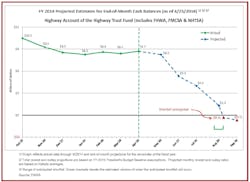Obama expands infrastructure fast-tracking; urges Congress to fix Highway Trust Fund
In a speech on the nation’s infrastructure crisis yesterday, President Obama announced he was taking executive action to further expedite fast-track federal permitting for major projects.
He also challenged Congress to act swiftly to replenish the rapidly draining Highway Trust Fund.
Speaking at Tarrytown, NY, Obama touted the $3.9-billion project to replace the aging Tappan Zee Bridge, a major Hudson River crossing, looming in the background as an example of how cutting red tape can accelerate infrastructure repairs and expansion.
“I took action on my own to fast-track the permitting process for major projects like this one,” Obama stated. “Normally, it would have taken three to five years to permit this bridge; we did it in a year and a half.”
He then announced the launch of a new “national permitting center” that would fast-track the permitting process for major infrastructure projects by “cutting the “bureaucratic red tape that stalls good projects from breaking ground.
“We are aiming to put every major infrastructure project on a public dashboard so everybody can go online; track our progress; hold us accountable; make sure things are coming in on time, on budget; make sure your taxpayer money is being used well,” said the President, “but also make sure that we’re putting folks back to work rebuilding America.”
There were no other new policy proposals contained in the speech. David Goldberg, communications director for the Transportation for America (T4America) advocacy group, told FleetOwner that the President’s remarks “were consistent with his Administration's proposal for renewing the federal transportation program released last month.
“The draft bill to reauthorize MAP-21, which expires September 30, would authorize $302 billion over four years, adding $87 billion to the expected oil and gasoline tax receipts,” he pointed out.
“The President has proposed getting that money from corporate tax reforms that would induce the repatriation of taxable profits,” Goldberg continued. “We would welcome a one-time infusion of that size. But we are concerned by the lack of any momentum in that direction in Congress, and would prefer to see a longer-term solution in the form of fees or sales taxes related to oil and gas production and consumption.”
Turning to the looming crisis of the ever-shrinking balance in the Highway Trust Fund, the President also remarked yesterday that “helping states and cities fund infrastructure is one of Congress’s chief responsibilities.”
He then challenged legislators to act quickly, warning that if the House and Senate “don’t act [to address the Highway Trust Fund deficiency] by the end of the summer, federal funding for transportation projects will run out -- will run out. There will be no money. The cupboard will be bare. And all told, nearly 700,000 jobs would be at risk over the next year.”
Obama noted that there are right now “more than 100,000 active projects paving roads and rebuilding bridges, modernizing our transit systems” in place.
But, pointed out the President, without timely Congressional action on the Highway Trust Fund, the “states might have to choose which ones to put the brake on. Some states are already starting to slow down work because they’re worried Congress won’t untangle the gridlock on time.”
As for how the Highway Trust Fund will get fixed, T4America’s Goldberg is a realist.
“In this election year,” he advised, “Congress does not appear prepared to tackle the long-term funding crisis at all. Rather, the expectation is that the finance committees will negotiate a transfer from the general fund to the Highway Trust Fund to prevent the shutoff of federal reimbursements that otherwise would begin this summer, in order to get us at least through the election.
“At this point,” he continued, “the Congressional Budget Office has said there will be a shortfall of $18 billion for the coming fiscal year if nothing is done.
“The gap is growing each year and few Congressional leaders seem to think such transfers are sustainable in the future,” Goldberg added, “but the solution at this point is nowhere in sight.”
